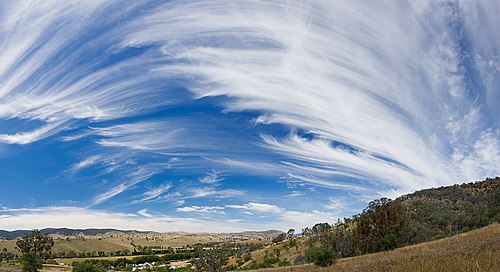Cirrus clouds are characterized by thin, wisplike strands, often accompanied by tufts. They are formed when water vapor freezes into ice crystals at altitudes above 8,000 metres (26,247 ft). Due to the sparse moisture at a high altitude, they tend to be very thin. Cirrus clouds cover up to 30% of the Earth and have a net heating effect. They efficiently absorb outgoing infrared radiation (heat) beneath them (greenhouse effect), while only marginally reflecting incoming sunlight (albedo).Photo: Fir0002
